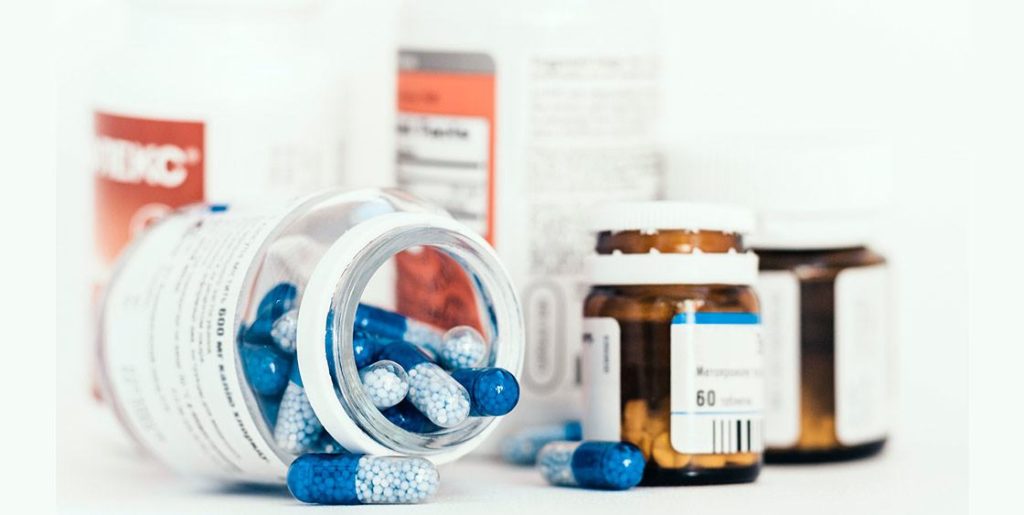Natural Prostate Cancer Supplements that Prevent Prostate Cancer
Prostate cancer supplements are recommended for those who are suspected of having prostate cancer but whose PSA is still less than 10ng/ml and are in doubt about whether or not to undergo a biopsy, or who are on “watchful waiting/active surveillance” or his family member has a history of prostate cancer, ovarian cancer, breast cancer. A current estimate is that one in every six men in the United States will be diagnosed with prostate cancer.
The most important and basic prostate cancer supplements are :
- Alpinia zerumbet (Shell Ginger) 2000 ~3000mg /day
- Vitamin K2 100 mcg/day
- IP6 1000 mg/day
- Zinc 20 ~30 mg/day
- Selenium 200 mcg/day
- Fish Oil 2000~3000 mg/day
These prostate supplements are effective not only to make your prostate healthy but also to keep your cerebrovascular system young. Therefore even if you don’t suffer from any prostate problems or if you are a woman, these supplements are recommended.
If your PSA is higher than 10ng/ml, or if your PSA is increasing after 3-month-take of these supplements, please add one or two of the followings. Or if affordable, from the beginning, you can take one of them below together with above supplements for prostate cancer.
- Pomegranate
- Saw palmetto
- Epilobium
- Green tea extract (epigallocatechin gallate)
- Pygeum
If your Gleason score is high, please don’t rely on alternative natural supplements alone. Surgery, or radiation, or hormone therapy is imperative. Otherwise metastasis would take place. Natural supplements have their own limit. They are not a panacea.
If metastasis already occurred, immediately undergo modern mainstream medicine. Please trust it, too. And in any cases, when you take the natural supplements, please talk to your doctor.
1) Alpinia zerumbet (Shell Ginger : JIPANG Ginger®)
Alpinia zerumbet is its scientific name, and Shell Ginger is the common name. This is a perennial plant of the ginger family. But Shell Ginger is not the same as ordinary ginger. Don’t confuse it with ordinary ginger. Very much different in health benefits. It contains various phytochemicals such as followings.
Polyphenols
- Ferulic acid: It acts on the cell cycle of prostate cancer cells and promotes apoptosis of cancer cells.
(https://link.springer.com/article/10.1007/s13277-015-3689-3) - Quercetin: It suppresses androgen receptor function of prostate cancer cells.
(https://academic.oup.com/carcin/article/22/3/409/2733786) - Kaempferol stimulates the macrophage colony-stimulating factor of cancer cells.
(https://www.sciencedirect.com/science/article/pii/S0303720708000245#!)
These 3 polyphenols are just typical examples. Shell Ginger contains much more polyphenols. Therefore it shows very strong antioxidant effect synergistically.
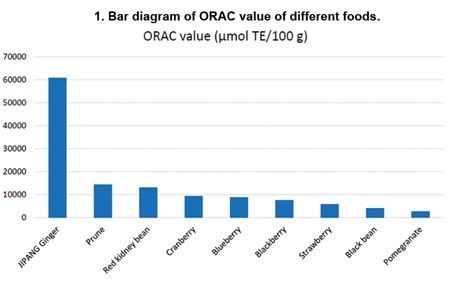
ORAC (Oxygen Radical Absorbance Capacity) FAZM (Fermented Powder of Leaves of Alpinia zerumbet-MAKISES: JIPANG Ginger®)
- Lactones : DDK (dihydro-5,6-dehydrokawain) & DK (5,6-dehydrokawain)
The most characteristic of Shell Ginger is that it contains DDK and DK very much.
- DDK and DK have the interleukin-12 (IL-12) inhibitory activity.
Selective neutralization of IL-12 p40 monomer induces death in prostate cancer cells via IL-12–IFN-γ.
(https://www.pnas.org/content/114/43/11482.short) - DDK and DK inhibit directly PAK1 (RAC/CDC42-activated kinase 1) which is the major oncogenic kinase that is responsible for a wide variety of diseases such as cancers.
- DDK and DK have the interleukin-12 (IL-12) inhibitory activity.
2) Vitamin K2
When varicocele occurs, free testosterone flows in the veins near the prostate 130 times more than usual. Testosterone itself does not cause prostate cancer, but dihydrotestosterone (DHT), which is metabolized from it, is produced in large quantities. The prostate has an enzyme called 5-α-reductase that converts testosterone to DHT. DHT is the culprit that causes hyperplasia or cancer of the prostate. It is necessary to prevent thickening and calcification of smooth muscles in the venous wall media that cause varicocele. That requires vitamin K2.
Caution: People taking warfarin should not take vitamin K2.
3) IP6
This is an abbreviation for inositol hexaphosphate, also called phytic acid. A type of phosphoric acid compound in which inositol is bound to phosphoric acid.
About 60 years ago, research began when applied to the prevention and treatment of kidney stones. Since then, it has been found that IP6 has many beneficial effects such as reducing the risk of coronary heart disease, thrombosis, embolism, etc. by improving platelet aggregation, improving lipids such as cholesterol, and preventing anemia. Of particular interest is its anticancer effect. It is effective against colorectal cancer, breast cancer, lung cancer, leukemia, and malignant melanoma. It is also effective against prostate cancer.
Prostate Cancer and Inositol Hexaphosphate: Efficacy and Mechanisms (http://ar.iiarjournals.org/content/25/4/2891.short)
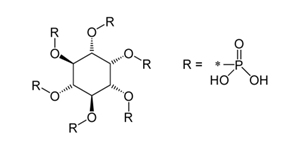
4) Zinc
Zinc can also be used as supplements for prostate cancer. Prostate cells usually contain a lot of zinc, but when prostate cancer develops, zinc gets significantly reduced. In order to suppress the growth of cancer cells, a large amount of zinc is required to block the expression of androgen receptor in prostate cells.
Zinc Inhibits Expression of Androgen Receptor to Suppress Growth of Prostate Cancer Cells(https://www.mdpi.com/1422-0067/19/10/3062)
5) Selenium
Selenium is another thing that is usually recommended when it comes to prostate cancer supplements. Selenium is an essential component mineral of an enzyme called glutathione peroxidase, a high molecular weight antioxidant. Therefore a shortage of selenium brings about greatly reduced ability to scavenge oxygen radicals.
The selenium content of the toenails is accurate indicator of how much selenium has been consumed over time. The amount of selenium in the toenails of 58279 men (55-69 years old) in the Netherlands and the incidence of prostate cancer were followed up for 6.3 years. The smaller the amount of selenium, the higher the incidence of prostate cancer. (Similar results for lung cancer).
After 6.3 years of follow-up Toenail Selenium Levels and the Subsequent Risk of Prostate Cancer (http://cebp.aacrjournals.org/content/12/9/866.short)
6) Fish Oil : EPA (eicosapentaenoic acid) & DHA (docosahexaenoic acid)
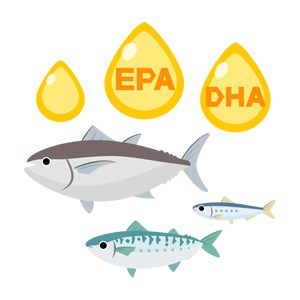
This is a study in Auckland, New Zealand. They compared EPA and DHA-derived phosphatidylcholine levels in red blood cells of 317 prostate cancer patients and 480 non-prostate cancer patients. Those who consumed a lot of EPA and DHA had a lower incidence of prostate cancer.
Prostate cancer risk and consumption of fish oils: A dietary biomarker-based case–control study
(https://www.nature.com/articles/6690835)
EPA and DHA are abundant in fish oil. These two omega-3 unsaturated fatty acids are thought to act on the metabolic pathway of arachidonic acid. The presence of excess arachidonic acid increases the enzyme 5-LOX (5-lipoxygenase). This enzyme stimulates the growth of prostate cancer. This enzyme also converts arachidonic acid into a fatty acid called 5-HETE (5-hydroxyeicosatetraenoic acid). This fatty acid inhibits cancer cell apoptosis. Prostate cancer tissue contains 6-times more 5-LOX than normal prostate tissue, and 5-HETE is 2.2 times more.
Arachidonic acid is abundant in red meat. It is also metabolized from vegetable oils such as safflower oil, sunflower oil and rapeseed oil, which contain a large amount of unsaturated fatty acids of omega-6.
Therefore, to prevent prostate cancer, avoid eating meat and don’t use vegetable oils. And eat fish that is high in EPA and DHA.
*If Krill Oil is available, it is more recommended than Fish Oil because Krill Oil contains Astaxanthin, too
7) Pomegranate
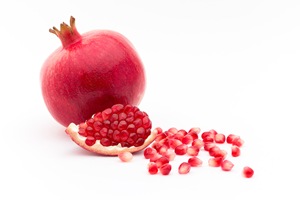
Combinations of ellagic acid, luteolin, punicic acid, etc., abundant in pomegranate, have proven to be particularly effective for prostate cancers that are prone to metastasis.
Luteolin, ellagic acid and punicic acid are natural products that inhibit prostate cancer metastasis
(https://academic.oup.com/carcin/article/35/10/2321/323353)
And urolithin A, which is metabolized from ellagic acid by intestinal bacteria, promotes prostate cancer apoptosis.
Urolithin A induces prostate cancer cell death in p53-dependent and in p53-independent manner.
(https://www.ncbi.nlm.nih.gov/pubmed/31177307)
In addition, urolithin A does not only bring about good effects for prostate health but also activates mitochondria and prevents muscle weakness. It is also effective against muscle loss due to aging, so-called “sarcopenia”.
The prevalence of prostate cancer increases with age. In other words, it is often at the age of sarcopenia. Therefore, it should be very reasonable to supplement phytochemicals such as ellagic acid with pomegranate since when you are still robust late 40s. Pomegranate also has a blood pressure lowering effect and LDL cholesterol reducing effect, so it can be used as a supplement against metabolic syndrome. People with metabolic syndrome are more likely to have problems with the prostate. So this is also very effective for prostate cancer supplement.
8) Saw palmetto
This plant is a short palm native to North America. It is called so because the leaves are jagged like a “saw”. It has been used to reduce prostate enlargement all over the world.
Often people think testosterone causes prostate enlargement or prostate cancer. But that’s wrong. The villain is not testosterone. If testosterone is the cause, why does prostatic hyperplasia or prostate cancer rarely occur during the youngest period when testosterone level is the highest? The real cause is dihydrotestosterone (DHT). And with aging, testosterone is converted by aromatase into estrogen that proliferates prostate tissue.

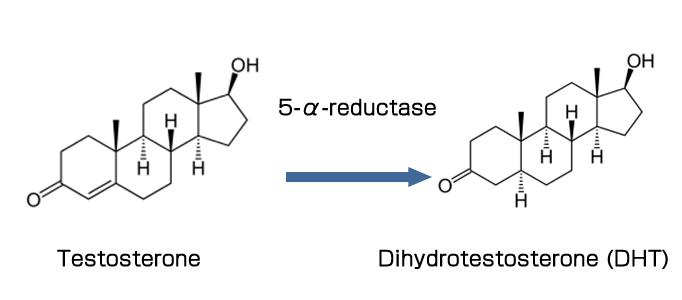
Saw palmetto extract inhibits the activity of 5-α-reductase of the prostate and prevents testosterone from being converted into dihydrotestosterone (DHT). DHT not only proliferates prostate tissue and causes prostate enlargement, but also upregulates androgen and CXCR4 (a type of chemokine) receptor to promote prostate cancer metastasis. Therefore, this prostate supplement is recommended especially for the patients on “watchful waiting/active surveillance”. Fibroblast growth factor (b-FGF), which is produced from testicular stromal cells, also promotes prostate enlargement, while saw palmetto extract suppresses the production of this factor.
It also blocks the effect of two enzymes, cyclooxygenase and lipoxygenase, reducing the inflammatory eicosanoids produced by these two enzymes and improving prostatitis, urethritis, and cystitis. If you search for “saw palmetto prostate” on Google Scholar, more than 100 papers will appear in 2019 alone. In other words, saw palmetto has been studied so much.
(https://www.sciencedirect.com/science/article/pii/B978012811397400007X#!)
9) Epilobium (Fireweed)
This plant has various effects on anti-inflammatory, anti-proliferation, antioxidant, anti-bacterial and anti-aging. Epilobium flavonoids and ellagitannins are considered the main active ingredients. In particular, oenothein B, a macrocyclic ellagitannin, inhibits hormone-dependent prostate cancer growth and reduces PSA secretion.
It is also converted into urolithins A, B, and C by intestinal bacteria, and urolithin C shows the strongest anticancer effect.
Oenotein B inhibits 5-α-reductase and prevents testosterone from being converted to DHT (dihydrotestosterone). This is the same as the action of saw palmetto extract.
In addition, it has a strong antibacterial effect against H. pylori and S. aureus.
Therapeutic Potential of Polyphenols from Epilobium angustifolium (Fireweed) (https://www.ncbi.nlm.nih.gov/pmc/articles/PMC5045895/#R135)
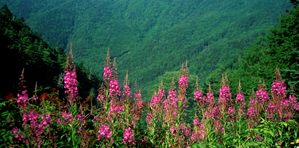
10) Green tea extract (epigallocatechin gallate)
Japanese men have less prostate cancer than foreign men because they drink tea more often”. This is often said not only about prostate cancer but also about lung cancer and colon cancer.
The catechins that are abundant in green tea are classified into polyphenol flavonoid flavanols, and there are mainly four types such as epicatechin, epigallocatechin, epicatechin gallate, and epigallocatechin gallate. Among them, epigallocatechin gallate is the most effective. It is often called EGCG for short. It is an ester of epigallocatechin and gallic acid. Green tea extract contains the most EGCG (approximately 60%).
Epigallocatechin is about 20%, epicatechin gallate is about 14%, and epicatechin is about 6%. The anticancer effect of EGCG has been studied extensively all over the world, and it has a comprehensive function such as promoting apoptosis of prostate cancer, blocking metastasis by inhibiting angiogenesis, and blocking the androgen receptor.
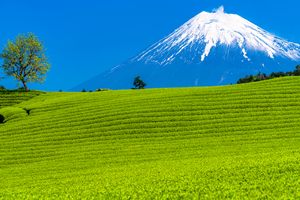
11) Pygeum
The scientific name is Prunus africana, an evergreen tree that grows in an African mountain forest and reaches a height of 30-40m. Traditionally, in Africa, drugs are made from the bark of this tree and used for antipyretic, stomach pain, dysuria and malaria. In recent years, its effects on prostate enlargement and prostate cancer have attracted attention, and it has been used in many countries as prostate cancer supplement.
The mechanism of action is due to the inactivation of prostate androgen receptors by compound, N-butylbenzene-sulfonamide (NBBS) , contained in Pygeum. Pygeum also inhibits an enzyme called 5-LOX (5-lipoxygenase). This enzyme stimulates the growth of prostate cancer. This enzyme converts arachidonic acid into a fatty acid called 5-HETE (5-hydroxyeicosatetraenoic acid). And this fatty acid inhibits apoptosis of cancer cells. Prostate cancer tissue contains 6-fold more 5-LOX than normal prostate tissue, and 2.2-fold more 5-HETE.
NBBS isolated from Pygeum africanum bark exhibits androgen antagonistic activity, inhibits AR nuclear translocation and prostate cancer cell growth
(https://link.springer.com/article/10.1007/s10637-009-9304-y)
Phytosterol Pygeum africanum regulates prostate cancer in vitro and in vivo
(https://link.springer.com/article/10.1007/s12020-007-0014-y)
Prostate cancer is one of the easiest cancers to cure.
With the exception of rare variants, prostate cancer is one of the easiest cancers to cure. This success in treatment is largely due to advances in surgery, radiotherapy, brachytherapy, and cryotherapy. Despite these improvements, there is a risk, albeit minimal, of erectile dysfunction (impotence) and incontinence in the wake of surgery or radiation therapy.
If surgery and radiation don’t cause impotence, hormone therapy ultimately leads to erectile dysfunction, and eventually prostate cancer cells become hormone refractory. For men with preexisting heart problem, androgen-deprivation therapy (= hormone therapy) increases the possibility of developing vascular disorders. Patients receiving chemotherapy can have serious side effects, affecting healthy cells and the immune system. Watchful waiting, also known as expectant management, is a reasonable strategy for men in their 70s or older, but for those under 70, that approach may be less appropriate. What is needed is more efficacious, safer, and noninvasive therapy for prostate cancer. A barrier is the limitations of what we know about the underlying mechanisms that drive prostate cancer and, like all cancers, various signaling pathways, proteins and genetic aberrations are involved, a complex process at best.
One theory is that prostate cancer is fueled by testosterone. However, very young men usually have a greater amount of free testosterone than older men, but rarely suffer from prostate cancer. Excess estradiol, converted from testosterone by aromatase, also plays a role in the development of prostate cancer. The hypothalamic-pituitary-gonadal axis, which controls embryonic development, reproduction and aging, is also involved. Gonadotropin-releasing hormone (GnRH) is produced by the hypothalamus, whereas luteinizing hormone (LH) and follicle-stimulating hormone (FSH) are produced by the anterior part of the pituitary gland, and the gonads produce estrogen and testosterone. LH stimulates the production of testosterone and estrogen in testicular Leydig cells. The prostate cancer picture is further embellished by two enzymes, 5-lipoxygenase (5-LOX) and aromatase. 5-LOX is critical in the synthesis of leukotrienes from arachidonic acid, and exacerbates prostate cancer. 5-LOX converts arachidonic acid into 5-hydroperoxyeicosatetraenoic acid (5-HPETE), which is spontaneously reduced to 5-hydroxyeicosatetraenoic acid (5-HETE). 5-HETE is a fatty acid that abrogates apoptosis, or the death, of prostate cancer cells. Aromatase converts testosterone to estradiol, which in excess amounts is carcinogenic.
Thus, to tackle prostate cancer, novel therapies must fulfill various roles, including enhancing immunity, regulating hormone dysregulation and enzymatic activity. A supplement already exists that can address these mechanisms. Shell Ginger (Alpinia zerumbet) improves immunity and re-establishes hormonal and enzymatic homeostasis, or balance. The leaves of Shell Ginger have been long used to prepare a tea, which is commonly drunk by the people of Okinawa, who have one of the longest life spans in the world.
I discovered the medicinal properties and activities of Shell Ginger. For the past 30 years, I have traveled to more than 85 countries in my quest to discover natural substances that can improve human health. This effort led me to identify the most effective and safest herb for treating prostate cancer, JIPANG Ginger, whose main active ingredient is derived from the fermented leaves of Shell Ginger.
Plants get energy by photosynthesis, which releases reactive oxygen species. The stronger the sunlight is, the more free radicals are produced, requiring plants to adopt compensatory mechanisms for protecting their leaves and stalks. I and my research team discovered the fact that Shell Ginger grown in tropical soil is packed with dozens of polyphenols, such as ferulic acid, chlorogenic acid, quercetin, kaempferol, epicatechin, catechin, and others. These polyphenols act synergistically to become powerful natural antioxidants with the ability to protect normal human cells.
Caution
Other vitamins should NOT be taken with my anti-prostate cancer formula. Cancer cells are by nature fairly clever entities because of their ability to escape from capture and annihilation by the immune system and continue to propagate. They are so clever that when they become resistant to traditional therapies, which they almost always do when the patient lives long enough, they are able to spread cancer to other parts of the body, or transmutate into different types of tumors. Among their bag of clever tricks is their ability to use various vitamins and minerals that people take to destroy cancer cells or to allay their development in the first place, and instead paradoxically use the vitamins to grow and metastasize. Cancer cells are avaricious and opportunistic, so we must be very careful not to fuel them by taking too many different supplements.
For example, according to the study of Jane C. Figueiredo, PhD, of the University of Southern California, Los Angeles, “Folic Acid and Risk of Prostate Cancer: Results From a Randomized Clinical Trial”, folic acid supplementation was associated with an increased risk of prostate cancer. Vitamin C is no exception. The danger exists that cancer cells utilize vitamin C to grow. Thus, the commonly utilized mega dose vitamin C therapy is quite controversial and its benefits are moot.
Some people have asked why my prescription does not contain lycopene. Lycopene has long been touted as a natural and effective remedy for prostate cancer, and it is if it is ingested from whole tomatoes. The concentrated extract of lycopene, on the other hand, is dangerous, similar to β-carotene supplementation. Supplemental β-carotene has been associated with an increased risk of prostate cancer, cardiovascular disease and overall mortality in people who smoke cigarettes. The possibility exists that this danger extends to non-smokers. Lycopene is a carotenoid and too much of it is simply not safe, however, no one knows how much is too much.
Dr. Makise - After following your protocol of JIPANG Ginger and flax for 2 months, my PSA has fallen from 62 to 29. Hopefully, the next two months will have it down to 0. I'm down to my last bottle of JIPANG Ginger. I called your number and they said they were out of the product. Could you see that I get some more before I run out? Thank you. I used the JIPANG Ginger to help me survive prostate cancer. It worked very well. I am now cancer-free. I know of other people that are now contacting me with inoperable forms of terminal cancer. I was hoping they would be able to purchase the ginger to start taking and at least give them some hope. Please let me know if they will be able to purchase directly from you. Thank you.
